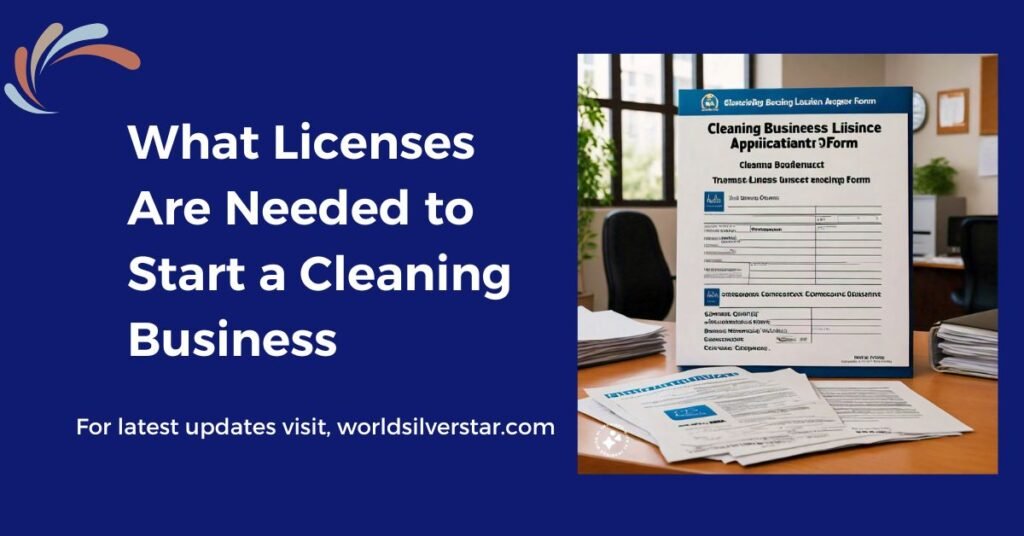Introduction:
Starting a cleaning business can be an exciting venture, but it’s important to understand the necessary licenses and permits to operate legally. In this comprehensive guide, we’ll break down the essential licenses needed to start your cleaning business in the UK. Whether you’re planning to offer residential, commercial, or specialized cleaning services, this article will provide you with the information you need to get started on the right foot.
Understanding the Basics
To begin, let’s cover the basics of starting a cleaning business. Unlike some other businesses, starting a cleaning service doesn’t require a significant investment in equipment or infrastructure. With just a few cleaning supplies and determination, you can launch your own cleaning business. Here’s what you need to do:
Create a Business Plan:
Before diving into the world of entrepreneurship, it’s essential to have a clear plan in place. Your business plan should outline your services—residential, commercial, or specialized cleaning—target market, pricing strategy, and how you plan to stand out. Maybe you’re all about eco-friendly products or super speedy service. Whatever it is, make it clear.
Register Your Business:
Next, you’ll need to register your cleaning business with the appropriate authorities. This typically involves choosing a business name, deciding on a legal structure (such as sole proprietorship or limited company), and obtaining the necessary licenses and permits.
Get Insurance and Bonding:
Insurance and bonding are crucial for protecting your business and your clients. Insurance provides financial protection in case of accidents or damages, while bonding guarantees that you’ll fulfill your contractual obligations. By investing in insurance and bonding, you’ll instill confidence in your clients and demonstrate your professionalism.
Buy Supplies:
Of course, no cleaning business can operate without the right tools for the job. Start by purchasing basic cleaning supplies like mops, brooms, and disinfectants. Depending on the types of services you offer, you may also need specialized equipment such as carpet cleaners or pressure washers.
Set Your Prices:
Determining your pricing strategy is another important aspect of starting a cleaning business. Researching local competitors and understanding the market demand will help you set competitive yet profitable prices for your services. Whether you charge by the hour, by the room, or with a flat rate, transparency is key to building trust with your clients.
Market Your Business:
Finally, don’t forget to market your cleaning business to attract clients. Establishing a professional online presence through a website and social media channels can help you reach potential customers. Consider offering special promotions or discounts to incentivize new clients to give your services a try.
Essential Licenses for Your Cleaning Business
Now that we’ve covered the basics, let’s delve into the specific licenses and permits you’ll need to start your cleaning business in the UK. While requirements may vary depending on your location and the nature of your services, here are some essential licenses to consider:
Business License:
In most cases, you’ll need a general business license to legally operate your cleaning business. This license registers your business with the government and ensures compliance with local regulations. You can obtain a business license through your local council or government authority.
Specialized Cleaning Licenses:
Depending on the types of services you offer, you may need specialized licenses or certifications. For example, if you provide services that involve handling hazardous materials or medical waste, you’ll need additional licensing to ensure safety and compliance.
Sales Tax Permit:
If your cleaning business charges sales tax on services, you’ll need a sales tax permit to collect and remit these taxes to the government. This permit ensures compliance with tax regulations and may be required depending on your business’s revenue and location.
Home Occupation Permit:
If you operate your cleaning business from home, you may need a home occupation permit to ensure compliance with zoning regulations. This permit verifies that your business activities are compatible with residential areas and may be obtained through your local council or planning department.
Specialized Cleaning Licenses and Certifications
In addition to the essential licenses mentioned above, certain types of cleaning services may require specialized licenses or certifications. Here are some examples:
Medical and Health Facility Cleaning:

Cleaning professionals who work in medical and healthcare facilities may require specific permits and certifications due to the sensitive nature of the environment. This may include permits for handling biohazardous materials, certifications in infection control, and compliance with health and safety regulations.
Industrial Cleaning:
Industrial cleaning involves working in settings such as factories, warehouses, and power plants, where specialized equipment and safety protocols are necessary. Depending on the nature of the work, industrial cleaners may need permits for hazardous waste disposal, certifications in OSHA compliance, and licenses for specific cleaning techniques.
Mold Removal and Remediation:
Mold remediation requires expertise in identifying and safely removing mold from residential and commercial properties. Professionals in this field may need licenses for mold remediation, certifications from organizations such as the Institute of Inspection, Cleaning and Restoration Certification (IICRC), and compliance with environmental regulations.
Benefits of Obtaining Cleaning Licenses and Certifications
Now that we’ve covered the necessary licenses and certifications for starting a cleaning business, let’s explore the benefits of obtaining these credentials:
Credibility and Trust:
Obtaining licenses and certifications demonstrates your professionalism and commitment to quality. Clients are more likely to trust and hire a cleaning business that holds the necessary credentials, giving you a competitive edge in the market.
Compliance with Legal Requirements:
Many jurisdictions require specific licenses for certain types of cleaning services to ensure compliance with health, safety, and environmental regulations. By obtaining the required licenses and certifications, you’ll avoid potential fines and penalties for operating illegally.
Access to Specialized Markets:
Certain cleaning niches, such as medical or industrial cleaning, are only accessible to licensed professionals. By obtaining the necessary licenses and certifications, you’ll gain access to lucrative markets and opportunities for long-term contracts.
Improved Safety Standards:
Licenses and certifications often involve training and education in best practices for cleaning, sanitation, and safety. By investing in training for yourself and your team, you’ll enhance safety standards and reduce the risk of accidents or injuries on the job.
Networking and Resources:
Obtaining licenses and certifications connects you with professional organizations and networks within the cleaning industry. These connections provide access to valuable resources, industry updates, and potential business opportunities for growth and expansion.
Insurance Options for Your Cleaning Business
In addition to licenses and certifications, insurance is another essential component of starting a cleaning business. Here are some common types of insurance options to consider:
General Liability Insurance:
General liability insurance protects your cleaning business against claims of property damage or bodily injury caused by your services. This coverage is essential for protecting your business assets and reputation in the event of a lawsuit.
Workers’ Compensation Insurance:
If you have employees, workers’ compensation insurance is mandatory in most states to cover medical expenses and lost wages in the event of a work-related injury or illness. This coverage provides financial protection for both your employees and your business.
Commercial Property Insurance:
Commercial property insurance protects your business property, equipment, and inventory against damage or loss due to fire, theft, or other covered perils. This coverage is essential for safeguarding your assets and ensuring business continuity in the event of a disaster.
Commercial Auto Insurance:
If your cleaning business uses vehicles for transportation, commercial auto insurance provides coverage for accidents, damage, and liability while driving for business purposes. This coverage protects your business vehicles and drivers on the road.
Janitorial Bonds:
Janitorial bonds protect your clients against theft or dishonesty by your employees. This coverage provides financial reimbursement to clients in the event of theft or property damage caused by your employees while on the job.
Umbrella Insurance:
Umbrella insurance provides additional liability coverage beyond the limits of your existing insurance policies. This coverage protects your business assets and personal finances in the event of a catastrophic loss or lawsuit.
Before diving into obtaining licenses for your cleaning business, it’s crucial to validate your ideas, ensuring success in business and entrepreneurship by understanding your market and customer needs.
Conclusion:
Starting a cleaning business requires careful planning and attention to detail, especially when it comes to obtaining the necessary licenses, certifications, and insurance. By investing in the right credentials and protections, you’ll build credibility, ensure compliance with regulations, and protect your business and clients from potential risks. Whether you’re offering residential, commercial, or specialized cleaning services, obtaining the required licenses and insurance coverage will set you up for success in the competitive cleaning industry.

